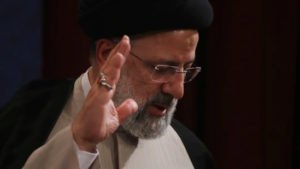![]()
Iran’s president-elect said Monday he would not meet with President Joe Biden nor negotiate over Tehran’s ballistic missile program and its support of regional militias, sticking to a hard-line position following his landslide victory in last week’s election.
Judiciary chief Ebrahim Rai
Tehran’s fleet of attack aircraft dates largely back to before the 1979 Islamic Revolution, forcing Iran to instead invest in missiles as a hedge against its regional Arab neighbors, who have purchased billions of dollars in American military hardware over the years. Iran also relies on militias like Yemen’s Houthis and Lebanon’s Hezbollah to counterbalance against enemies like Saudi Arabia and Israel, respectively.
On a possible meeting with Biden, Raisi simply answered: “No.” His moderate competitor in the election, Abdolnasser Hemmati, had suggested during campaigning that he’d be potentially willing to meet Biden.
The White House did not immediately respond to Raisi’s statements Monday. Raisi will become the first serving Iranian president sanctioned by the U.S. government even before entering office, in part over his time as the head of Iran’s internationally criticized judiciary — one of the world’s top executioners.
si also described himself as a “defender of human rights” when asked about his involvement in the 1988 mass execution of some 5,000 people. It marked the first time he’s been put on the spot on live television over that dark moment in Iranian history at the end of the Iran-Iraq war.
“The US is obliged to lift all oppressive sanctions against Iran,” Raisi said at the news conference.
Raisi sat in front of a sea of microphones, most from Iran and countries home to militias supported by Tehran. He looked nervous at the beginning of his comments but slowly became more at ease over the hour-long news conference.
Asked about Iran’s ballistic missile program and its support of regional militias, Raisi described the issues as “non-negotiable.”
The victory of Raisi, a protégé of Iran’s Supreme Leader Ayatollah Ali Khamenei, came amid the lowest turnout in the Islamic Republic’s history. Millions of Iranians stayed home in defiance of a vote they saw as tipped in Raisi’s favor.
Of those who did vote, 3.7 million people either accidentally or intentionally voided their ballots, far beyond the amount seen in previous elections and suggesting some wanted none of the four candidates. In official results, Raisi won 17.9 million votes overall, nearly 62% of the total 28.9 million cast.
Raisi’s election puts hard-liners firmly in control across the government as negotiations in Vienna continue to try to save a tattered deal meant to limit Iran’s nuclear program, at a time when Tehran is enriching uranium at 60%, its highest levels ever, though still short of weapons-grade levels. Representatives of the world powers party to the deal returned to their capitals for consultations following the latest round of negotiations on Sunday.
Raisi struck a defiant tone, however, when asked about the 1988 executions, which saw sham retrials of political prisoners, militants and others that would become known as “death commissions.”
After Iran’s then-Supreme Leader Ruhollah Khomeini accepted a UN-brokered cease-fire, members of the Iranian opposition group Mujahedeen-e-Khalq, heavily armed by Saddam Hussein, stormed across the Iranian border in a surprise attack. Iran ultimately blunted their assault.
The trials began around that time, with defendants asked to identify themselves. Those who responded “mujahedeen” were sent to their deaths, while others were questioned about their willingness to “clear minefields for the army of the Islamic Republic,” according to a 1990 Amnesty International report.
International rights groups estimate that as many as 5,000 people were executed. Raisi served on the commissions.
“I am proud of being a defender of human rights and of people’s security and comfort as a prosecutor wherever I was,” he said. “All actions I carried out during my office were always in the direction of defending human rights,” he added. “Today in the presidential post, I feel obliged to defend human rights.”







